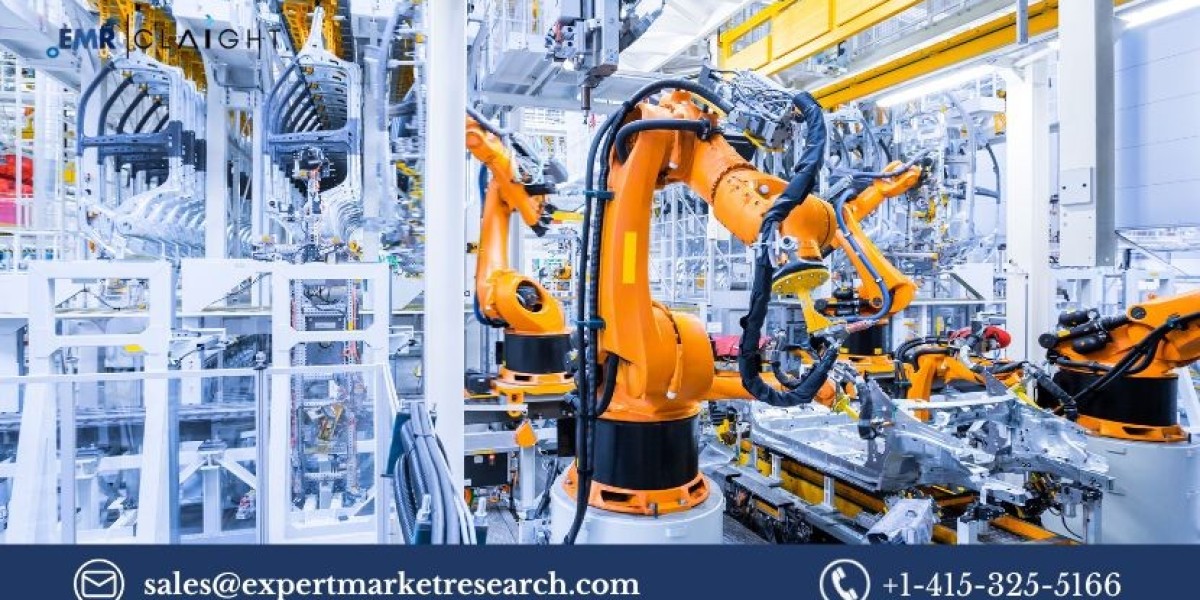The industrial automation market has been experiencing steady growth in recent years, driven by the ongoing advancements in technology and the growing demand for efficiency and productivity in industries worldwide. The market, valued at USD 192.74 billion in 2024, is projected to grow at a compound annual growth rate (CAGR) of 8.6% from 2025 to 2034, reaching an estimated value of USD 401.48 billion by the end of the forecast period. This article provides a detailed overview of the industrial automation market, covering its size and share, key market dynamics, trends, growth prospects, challenges, and a competitive analysis.
Industrial Automation Market Overview
Industrial automation refers to the use of control systems, such as computers, robots, and information technologies, to control industrial processes and machinery in manufacturing and other production environments. The primary objective of industrial automation is to enhance productivity, reduce human intervention, improve product quality, and ensure safety in industrial operations.
Automation has become a critical component of industries across various sectors, including manufacturing, automotive, chemicals, food and beverages, pharmaceuticals, and energy. The growing demand for precision, operational efficiency, and the ability to work in hazardous environments is driving the widespread adoption of automation solutions.
As the industry continues to evolve, emerging technologies like artificial intelligence (AI), machine learning, industrial internet of things (IIoT), and robotics are playing a pivotal role in reshaping the industrial automation landscape. These technologies enable real-time monitoring, predictive maintenance, and data-driven decision-making, which are increasingly sought after by businesses to optimize their operations and reduce costs.
Industrial Automation Market Size & Share
The global industrial automation market reached a value of USD 192.74 billion in 2024. As industries continue to embrace automation technologies, the market is set to grow at a CAGR of 8.6% during the forecast period from 2025 to 2034. By 2034, the market is expected to attain a value of USD 401.48 billion.
Regional Market Share
North America: North America is one of the largest markets for industrial automation, driven by technological advancements, the presence of key industry players, and a strong industrial base. The U.S. plays a significant role in the region’s market growth, with industries such as automotive, aerospace, and electronics adopting advanced automation systems to enhance productivity and competitiveness.
Europe: Europe is another prominent market for industrial automation, with countries like Germany, the UK, and France leading the way. The region’s strong manufacturing sector, along with investments in smart factories and industry 4.0 technologies, has fueled the demand for automation solutions. The European Union’s regulatory push for reducing carbon emissions and improving energy efficiency further supports the adoption of automation technologies.
Asia-Pacific: The Asia-Pacific region is expected to witness the highest growth in the industrial automation market. Countries such as China, Japan, India, and South Korea are rapidly adopting automation technologies to support their fast-growing manufacturing sectors. The increasing adoption of robotics, AI, and IoT-driven automation solutions in industries like automotive, electronics, and consumer goods is driving market expansion in this region.
Latin America and Middle East & Africa: Both Latin America and the Middle East & Africa are emerging markets for industrial automation. As industries in these regions continue to modernize, the demand for automation technologies is expected to grow, particularly in sectors like oil and gas, mining, and manufacturing.
Get a free sample request: https://www.expertmarketresearch.com/reports/industrial-automation-market/requestsample
Market Dynamics & Trends
The industrial automation market is shaped by various factors, including technological advancements, evolving industry needs, and changing regulatory environments. Key dynamics and trends driving the growth of the market include:
Technological Advancements in Automation
The evolution of automation technologies has significantly enhanced the capabilities of industrial processes. The integration of AI, machine learning, and the Industrial Internet of Things (IIoT) is revolutionizing how industries operate. These technologies enable real-time data analysis, predictive maintenance, and advanced control systems, which help businesses optimize their operations.
For example, AI and machine learning algorithms can predict equipment failure before it occurs, enabling maintenance teams to take preventive action and reduce downtime. Similarly, IIoT sensors can monitor machinery and production lines in real time, providing valuable insights for optimizing operations and improving efficiency.
Industry 4.0 and Smart Factories
Industry 4.0, or the fourth industrial revolution, is another key trend driving the adoption of industrial automation. This concept involves the use of cyber-physical systems, IoT, cloud computing, and data analytics to create smart factories that are highly connected, flexible, and efficient. Smart factories use automation to streamline production processes, reduce human intervention, and improve overall operational efficiency.
As manufacturers embrace Industry 4.0, there is a growing need for automated systems that can integrate seamlessly with existing infrastructure and provide real-time monitoring and control. The shift toward smart factories is expected to drive further demand for industrial automation solutions.
Demand for Customized Solutions
As businesses become more focused on operational efficiency and cost savings, there is an increasing demand for customized automation solutions. Companies are seeking tailored solutions that meet their specific requirements and integrate seamlessly into their existing operations.
Automation providers are responding to this demand by offering highly flexible and customizable solutions that can be adapted to different industries and business needs. This trend is expected to continue as industries look for ways to optimize production processes and reduce operational costs.
Energy Efficiency and Sustainability
With growing environmental concerns, industries are increasingly looking for ways to reduce their carbon footprint and improve energy efficiency. Industrial automation plays a critical role in achieving these goals by optimizing production processes, reducing waste, and improving resource utilization.
Automation technologies can help industries reduce energy consumption by optimizing machine performance, reducing downtime, and enhancing the efficiency of production lines. As companies become more focused on sustainability, the adoption of energy-efficient automation solutions is expected to grow.
Growth of the Industrial Automation Market
The industrial automation market is poised for substantial growth, driven by technological advancements, evolving consumer demands, and the need for enhanced efficiency across industries.
Adoption of Robotics and Automation in Manufacturing
Robotics is one of the key components of industrial automation. The increasing use of robots in manufacturing environments is expected to contribute significantly to market growth. Robots are being used for various tasks, including assembly, welding, painting, packaging, and material handling. The demand for collaborative robots (cobots) that can work alongside human workers is also on the rise, particularly in industries like electronics, automotive, and consumer goods.
The growing need for precision, speed, and safety in manufacturing processes is driving the adoption of robotic automation solutions. As the cost of robots continues to decline and their capabilities improve, the adoption of robotics in manufacturing is expected to increase, further driving the industrial automation market.
Expansion in Emerging Markets
Emerging markets, particularly in Asia-Pacific, Latin America, and the Middle East, present significant growth opportunities for industrial automation providers. As these regions industrialize and modernize their manufacturing sectors, the demand for automation technologies is expected to rise.
Countries like China and India, with their large manufacturing bases, are increasingly investing in automation solutions to improve productivity and maintain a competitive edge in global markets. Similarly, Latin America and the Middle East are seeing growing investments in automation in industries such as oil and gas, mining, and manufacturing.
Market Opportunities and Challenges
The industrial automation market offers several opportunities, but there are also challenges that companies must address to capitalize on these opportunities.
Opportunities
Integration of AI and IoT
The integration of AI, machine learning, and IoT into industrial automation systems presents significant growth opportunities. These technologies enable real-time monitoring, predictive maintenance, and advanced data analytics, which can help businesses optimize their operations and reduce downtime. Automation providers that can integrate these technologies into their solutions are well-positioned to capture a significant share of the market.
Increased Investment in Smart Factories
As manufacturers shift towards Industry 4.0 and smart factories, there is a growing demand for automation solutions that can support these advanced manufacturing environments. Companies that specialize in providing Industry 4.0-compliant automation solutions are poised for significant growth.
Government Support for Automation
Many governments are implementing policies and offering incentives to promote the adoption of automation technologies. Financial incentives, subsidies, and regulatory frameworks that encourage businesses to adopt automation solutions will further accelerate market growth.
Challenges
High Initial Costs
The cost of implementing industrial automation solutions can be a barrier for some companies, particularly small and medium-sized enterprises (SMEs). While automation provides long-term cost savings, the initial investment required for automation systems, robotics, and AI technologies can be significant. Overcoming this cost barrier will be crucial for expanding the adoption of industrial automation.
Cybersecurity Risks
As industries become more connected through IoT and automation technologies, cybersecurity risks are increasing. Industrial automation systems that rely on the internet and cloud computing are vulnerable to cyberattacks, which can disrupt operations and lead to significant financial losses. Addressing these security concerns will be essential for the continued growth of the industrial automation market.
Competitor Analysis in the Industrial Automation Market
The industrial automation market is highly competitive, with several key players dominating the landscape. Some of the leading companies in the market include:
Siemens AG
Siemens is a global leader in industrial automation, offering a wide range of products and solutions, including PLCs, drives, motors, and robots. The company is heavily invested in digitalization and Industry 4.0 technologies, making it a key player in the automation space.
Rockwell Automation, Inc.
Rockwell Automation is another major player in the industrial automation market, known for its automation control systems and software solutions. The company focuses on delivering intelligent automation solutions that help businesses optimize their operations.
ABB Ltd.
ABB is a leading provider of industrial automation solutions, with a strong presence in robotics, electrification, and control systems. The company is a key player in the automation of manufacturing processes, particularly in industries like automotive, oil and gas, and pharmaceuticals.
Schneider Electric
Schneider Electric is a global player in energy management and automation, providing solutions that help businesses optimize energy efficiency and improve operational productivity. The company’s automation solutions are widely used in industries such as manufacturing, infrastructure, and utilities.
The industrial automation market is expected to grow significantly over the next decade, driven by technological advancements, increasing demand for operational efficiency, and the growing adoption of AI, robotics, and IoT technologies. With a projected CAGR of 8.6% from 2025 to 2034, the market is set to reach USD 401.48 billion by 2034. While challenges such as high initial costs and cybersecurity risks remain, the opportunities presented by Industry 4.0, smart factories, and emerging markets provide a strong foundation for the continued growth of industrial automation.
Explore More Trending Blogs & Reports:
Top 10 Construction Companies:
https://www.expertmarketresearch.com/articles/top-construction-companies







